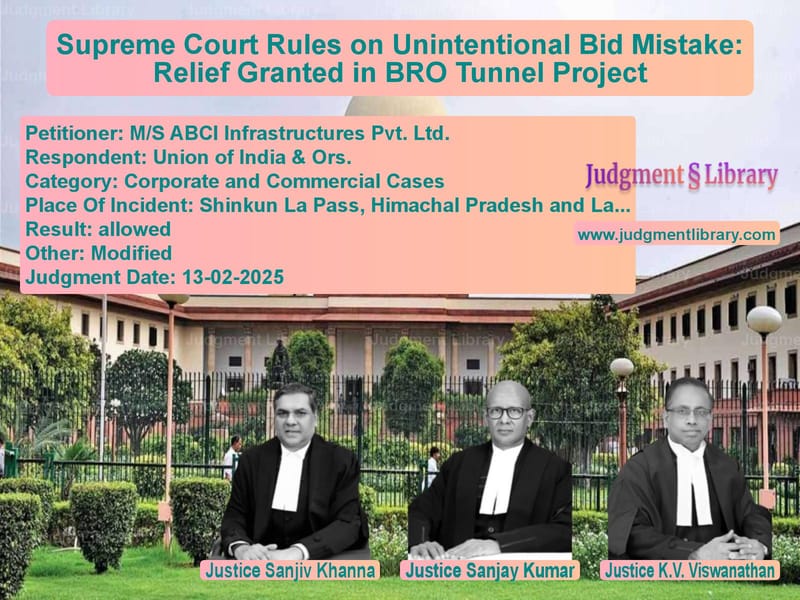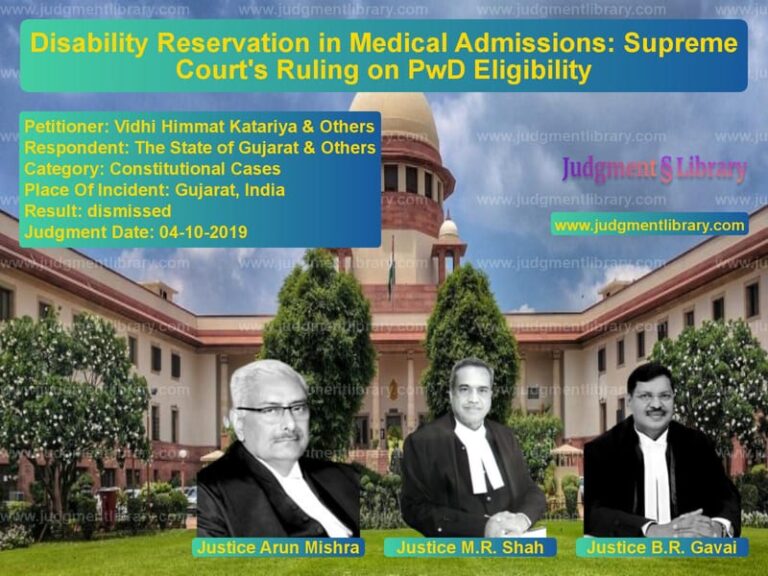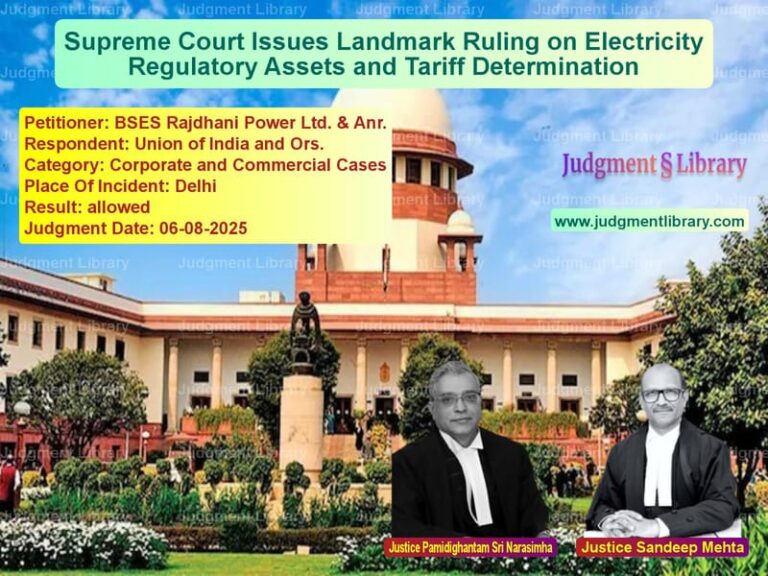Supreme Court Rules on Unintentional Bid Mistake: Relief Granted in BRO Tunnel Project
The case of M/S ABCI Infrastructures Pvt. Ltd. vs. Union of India & Ors. revolves around an unintentional error in a bid submitted for a large-scale infrastructure project. The Supreme Court ruled in favor of the appellant, granting relief from the forfeiture of its bank guarantee, while acknowledging the mistake made during the bidding process.
The dispute arose when the appellant, ABCI Infrastructures, mistakenly quoted a bid price of Rs. 1,569 instead of Rs. 1,569 crores for the construction of a 4.1 km twin tunnel at Shinkun La Pass, part of the Border Roads Organisation (BRO) project. Despite the obvious clerical error, BRO refused to acknowledge the mistake and insisted on forfeiting the bid security amount of Rs. 15.04 crores. The case highlights the balance between bidder responsibility and administrative fairness.
Background of the Case
The sequence of events leading to the dispute is as follows:
- February 23, 2023: BRO invited bids for the construction of two-lane twin tunnels at Shinkun La Pass, with an estimated cost of Rs. 1,504.64 crores.
- June 3, 2023: Ten bidders, including ABCI Infrastructures, submitted their technical and financial bids.
- June 5, 2023: Seven bidders, including ABCI, were declared technically qualified.
- August 24, 2023: Financial bids were opened, revealing that ABCI had quoted Rs. 1,569 instead of Rs. 1,569 crores.
- August 25, 2023: ABCI immediately informed BRO of the mistake, requesting correction or withdrawal of the bid.
- August 26, 2023: BRO sought a detailed price analysis from ABCI, treating the bid as valid.
- September 7, 2023: ABCI reiterated that the bid was a clerical error and should not be considered.
- September 16, 2023: BRO directed the bank to encash ABCI’s bid security of Rs. 15.04 crores.
- October 7, 2023: The Himachal Pradesh High Court upheld BRO’s decision.
- February 14, 2025: The Supreme Court reversed the decision, granting partial relief to ABCI.
Arguments Before the Supreme Court
ABCI Infrastructures (Appellant) Arguments
ABCI’s legal counsel argued:
- The bid of Rs. 1,569 was clearly a typographical error and should not have been considered valid.
- ABCI immediately acknowledged the mistake and informed BRO before any contract was executed.
- There was no financial loss to BRO, as a new tender was issued, and the contract was awarded at Rs. 1,290 crores, lower than the previous bid.
- Forfeiture of Rs. 15.04 crores was unjustified since ABCI never intended to back out of a legitimate bid.
- Legal precedents recognize that unilateral mistakes in tender submissions should be corrected when evident.
Union of India and BRO (Respondents) Arguments
BRO’s legal team countered:
- ABCI’s error delayed the project, necessitating a fresh tender and causing inconvenience to BRO.
- As per tender rules, any failure to execute the contract should result in forfeiture of the bid security.
- Allowing withdrawal of the bid could set a precedent for bidders to misuse the system.
Supreme Court’s Observations and Ruling
The Supreme Court, led by Chief Justice Sanjiv Khanna, Justice Sanjay Kumar, and Justice K.V. Viswanathan, analyzed the case and held:
“While ABCI committed a mistake, BRO’s rigid approach in ignoring an apparent error and proceeding with forfeiture was unnecessary. Practical decision-making should prevail over legalistic rigidity.”
The Court emphasized:
- The bid amount of Rs. 1,569 was an obvious error, given the project’s estimated cost of Rs. 1,504.64 crores.
- ABCI acted in good faith by informing BRO immediately after discovering the mistake.
- BRO should have allowed ABCI to withdraw the bid instead of insisting on enforcement.
- The project was eventually awarded at Rs. 1,290 crores, proving no financial loss was incurred.
Final Judgment
The Supreme Court ruled:
- ABCI must pay a penalty of Rs. 1 crore to BRO for the procedural delay.
- BRO must return the original bid security of Rs. 15.04 crores to ABCI.
- The High Court’s ruling was set aside.
Key Takeaways
- Judicial Approach to Bidding Errors: Unintentional clerical mistakes should be rectified when evident, rather than being used punitively.
- Fairness in Public Contracts: Government agencies should balance contractual obligations with practical considerations.
- Impact on Future Tenders: This ruling discourages excessive rigidity in bid evaluations while maintaining bidder accountability.
- Penalty Instead of Forfeiture: The Supreme Court’s decision sets a precedent for imposing reasonable penalties instead of outright forfeiture.
Conclusion
The Supreme Court’s ruling in this case ensures that fairness prevails in government contract bidding while maintaining accountability. The decision serves as a precedent for similar cases where genuine mistakes occur in financial bidding processes, emphasizing the need for practical decision-making in public contracts.
Petitioner Name: M/S ABCI Infrastructures Pvt. Ltd..Respondent Name: Union of India & Ors..Judgment By: Justice Sanjiv Khanna, Justice Sanjay Kumar, Justice K.V. Viswanathan.Place Of Incident: Shinkun La Pass, Himachal Pradesh and Ladakh.Judgment Date: 13-02-2025.
Don’t miss out on the full details! Download the complete judgment in PDF format below and gain valuable insights instantly!
Download Judgment: ms-abci-infrastruct-vs-union-of-india-&-ors-supreme-court-of-india-judgment-dated-13-02-2025.pdf
Directly Download Judgment: Directly download this Judgment
See all petitions in Corporate Compliance
See all petitions in unfair trade practices
See all petitions in Public Sector Employees
See all petitions in Judgment by Sanjiv Khanna
See all petitions in Judgment by Sanjay Kumar
See all petitions in Judgment by K.V. Viswanathan
See all petitions in allowed
See all petitions in Modified
See all petitions in supreme court of India judgments February 2025
See all petitions in 2025 judgments
See all posts in Corporate and Commercial Cases Category
See all allowed petitions in Corporate and Commercial Cases Category
See all Dismissed petitions in Corporate and Commercial Cases Category
See all partially allowed petitions in Corporate and Commercial Cases Category







